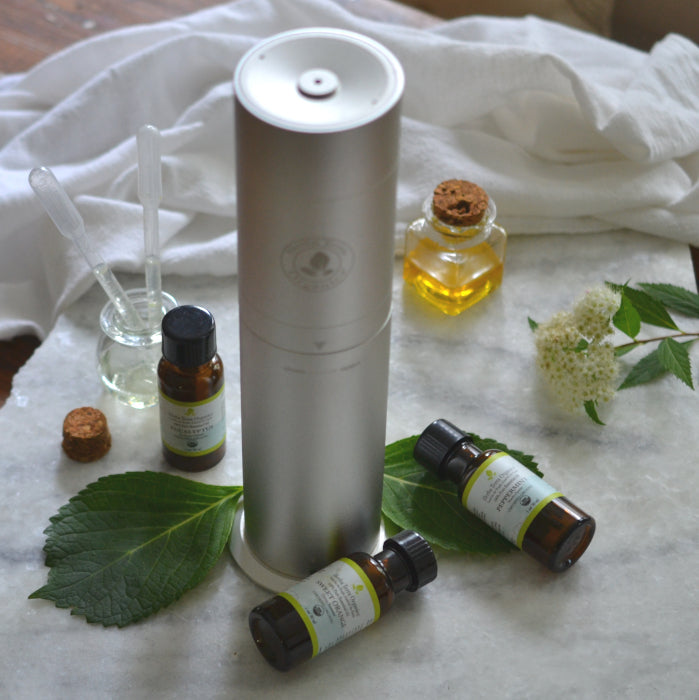I bet you’ve wondered at least once in how many ways can you can use your essential oils. If you did, you’ve come to the right place. Although they can be used by diffusing, ingesting, or applying on the skin, experts suggest that the best way to benefit from essential oils is by diffusing them. Why is that?
How TRUE Aromatherapy works
One interesting explanation for why aromatherapy may work for many people is that the part of the brain that associates odors is the same part of the brain that deals with memory. Stimulating this part of the brain generates a response in the body naturally. The smell is undoubtedly one of the most primitive senses since it allows messages to be sent through the nervous system to the limbic system, the part of the brain that controls emotions.
Aromatherapy best applications
As the name suggest, aromatherapy means therapy=aka healing with aromas, so going to a spa that uses artificial oils or fragrant oils that is the furthest you can be from any form of aromatherapy.
Genuine Aromatherapy is only the kind that uses essential oils; any spa that uses non-essential oils- is doing anything BUT aromatherapy, in fact using synthetic, fake essential oils, or oil fragrances ONLY harm your health on the long term. Aromatherapy is used in a wide range of sectors -- from health spas to hospitals -- to treat a variety of conditions. In general, it seems to relieve pain, improve mood, and promote a sense of relaxation. In fact, several essential oils -- including clary sage, geranium rose, orange, bergamot, lemon, sandalwood, and others have been shown to relieve anxiety, stress, and depression.
Several clinical studies suggest that when essential oils (particularly rose, patchouli, and frankincense) were used by qualified midwives, pregnant women felt less anxiety and fear, had a stronger sense of well being and had less need for pain medications during delivery. Many women also report that peppermint oil relieves nausea and vomiting during labor, and also physiotherapists report that peppermint alleviates pain and muscle sores in athletes.
Massage therapy with essential oils (combined with medications or therapy) may also benefit people with depression. The scents are thought by some to stimulate positive emotions in the area of the brain responsible for memories and emotions, but the benefits seem to be related to relaxation caused by the scents and the massage. In one study, studies on Neroli oil say it helped reduce blood pressure and pre-procedure anxiety among people undergoing a colonoscopy.
In some tests, chemical compounds from some essential oils have shown antibacterial and antifungal properties. Some evidence also suggests that citrus oils may strengthen the immune system and that peppermint oil may help with digestion. Fennel, aniseed, sage, and clary sage have estrogen like compounds, which may help relieve symptoms of premenstrual syndrome and menopause.
Other conditions for which aromatherapy may be helpful include:
- Agitation, possibly including agitation related to dementia and Alzheimer
- Anxiety
- Constipation (with abdominal massage using aromatherapy)
- Insomnia
- Pain: Studies have found that people with rheumatoid arthritis, cancer (using topical chamomile), and headaches (using topical peppermint) require fewer pain medications when they use aromatherapy
- Itching, a common side effect for those receiving dialysis
- Psoriasis, and much, much more.
Of course, there are certain groups or certain medical conditions when using essential oils requires proper caution. Pregnant women, people with severe asthma, high blood pressure, and people with a history of allergies should only use essential oils under the guidance of a trained professional and with full knowledge of a physician. Children under the age of 2 are also more sensitive to certain essential oils.
Which are the best essential oils to use?
Besides from always using USDA organic essential oils, consumers can also check to see if a particular plant species is native to the land it’s grown on. Native species typically grow with less intervention, because they are suited to the amount of rainfall, the type of soil, and the climate they are grown in. Non-native plants may need artificial climate control, chemical soil preparation and/or additional water due to the foreign environment they’re being grown in. This is the reason why the most potent essential oils for therapeutic and health benefits are the oils extracted from their native/origin countries.
Here are a few examples: the TEA TREE is native to Australia, which is also the largest producer in the world of tea tree oil, and the oil extracted from those trees is the absolute best quality you can find. Another big producer is China, who imported the seeds from Australia and replanted them to produce tea tree, but the chemical components of the tea tree oil is very much different from that produced on Australian soil.
The same is true for Bulgarian Rose oil, which when farmers tried to reseed it in other parts of the world the oils composition and scent also changed, same for Sadalwood, Helichrysum, Jasmine and some other exotic plants.
The same is true for many other oils which will radically change their chemical composition based on the soil, water, climate and air and of course, local agricultural practices, therefore when it comes to essential oils, the best oils are NOT your locally grown, locally produced ones but the ones that are native becase they will be the MOST POTENT for your health and wellbeing.
Although essential oils have been used for over 7000 years for medical, health and beauty purposes, only recently aromatherapy has started to become popular again as more and more people are looking to an alternative way of healing.
If you’re reading this blog, congratulate yourself for being ahead of those who know nothing about the power of essential oils and aromatherapy. If you know anyone who may benefit from this information, please feel free to share this post because sharing is caring.

